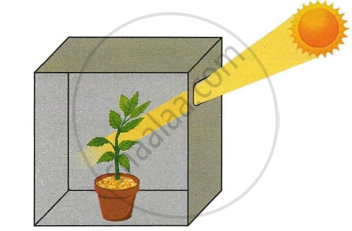Advertisements
Advertisements
प्रश्न
Define the following term:
Clinostat
उत्तर
The clinostat is a device that employs rotation to counteract the effects of gravitational force on plant growth. It is composed of two plant pots: one is stationary, while the other is rotated. The rotating plant demonstrates positive geotropism, as it is equally exposed to gravity from all directions, whereas the stationary plant exhibits negative geotropism, growing in the opposite direction.
संबंधित प्रश्न
Where is the auxin hormone made in a plant stem?
What does a stem (or shoot) do in response to gravity? What is this phenomenon known as?
What does a tendril do in response to the touch of a support? What is this phenomenon known as?
Which of the following acts as a stimulus in the process of hydrotropism?
(a) hydrocarbon
(b) hydrogen oxide
(c) hydrogen chloride
(d) hydrogen peroxide
The growth movement of a plant part in response to the touch of an object is called :
(a) thigmonasty
(b) hydrotropism
(c) thigmotropism
(d) geotropism
The bending of the stem of a plant towards a source of light is caused by the action of a phytohormone known as :
(a) abscisic acid
(b) auxin
(c) gibberellins
(d) cytokinin
Where are auxins synthesized in a plant? Which organ of the plant shows:
- Positive phototropism
- Negative geotropism
- Positive hydrotropism
Name the stimulus which causes the following movement in plant:
Geotropism
Define the following term:
Heliotropism
The figure given below depicts a kind of tropic movement in plants. Study the same and answer the following questions:

- What kind of a movement is shown in the figure? Define it.
- How does this movement differ from geotropism?
- Name the stimulus responsible for thigmotropism. Give one example of a plant showing thigmotropism.
- Name one stimulus which gives a positive response for the roots but a negative response for the shoot.
- Draw a neat and labelled diagram of the part of a plant showing leaf tendril. Name the plant.
